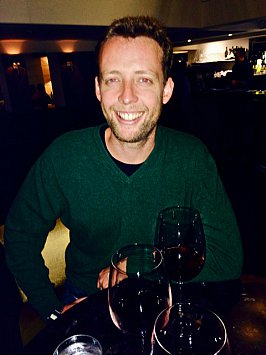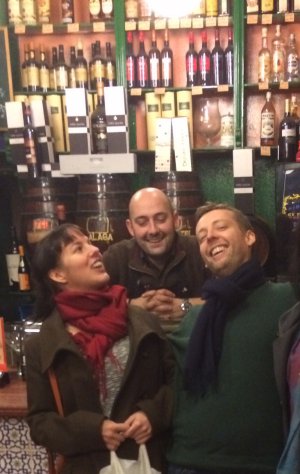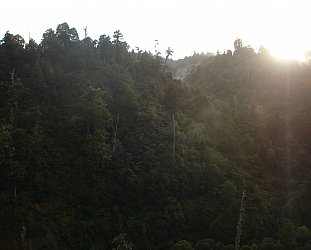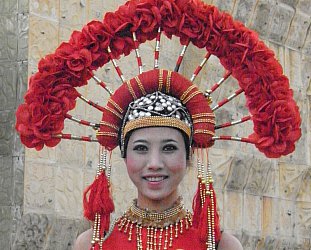Graham Reid | | 3 min read

Over the last drink in our night of bar-hopping James mentions in passing the reason why you always see food visible in Madrid's bars.
“It goes back to when people were illiterate so couldn't read a menu,” he says. And then later as we are walking the busy streets of Latina at 1.30am he drops another piece of relevant information. That at the time of the Spanish Civil War in the late 30s only about half the population of Spain could read.
James Blick – a former Aucklander and for the past three years resident in Madrid with his Spanish wife Yolanda– is a deep well of information having immersed himself in the bar and food culture, and history of his adopted city. And has latterly been turning his interests and expertise into a viable, and enviable career.
These days he takes food, bar and history tours of his city, and – because he is a habitue of the many taberna and restaurants in the vibrant neighbourhoods of the central city (and beyond) – he has built up an admirable relationship with many owners and knows their stories.

Or the stylish Sobrino de Botin which is considered the oldest, still operating restaurant in the world – founded in 1725 – and where the painter Goya worked as a waiter. Blick chats amiably with one of the waiters and the doors to the kitchen open for us where we can see row upon row of suckling pig coming out of the ancient, slow-cook wood-fire ovens.
But it is the smaller and less familiar places – such as a downstairs bar which can only accommodate 15 patrons where the flamenco-loving owner plays his own old videos and sings along – which Blick can introduce clients and friends to.
Two nights after our first introduction to the tapas and bars down narrow lanes in local neighbourhoods, he and Yoly take us across the city and near the bullring, then through anonymous suburban streets to an enthralling night of passionate flamenco song and dance at the little-known Cafetin La Quimera.
Blick – who in New Zealand had a career as a solicitor, worked in advertising, made some rock videos, and wrote and directed two award-nominated short films Us (2004) and Roof Rattling (09), the latter appeared regularly on Sky – decided to reinvent himself some years ago and his first inclination was towards travel writing. Being in Madrid allowed him access to continental Europe and beyond.
“Then I realised that you could go to all these places, it was better to just be 'the Spain guy', which is the name I use on Twitter. So that's what I've done.”
His book shelves are filled with Spanish history and culture, but much of what he knows has been picked up by just hitting the streets and bars.
And he jokingly dismisses that widespread notion – perpetrated by travel writers and foodies, he notes – that tapas is just those little plates which people in Spain eat around 6pm before going out for dinner after 10.
“Tapas can mean just about anything here,” he laughs. “Some people think it is the olives or whatever you are given with a drink, which is what all bars do anyway. But people make a meal of those small plates. They may start in one bar known for its olives and then someone will say, 'I know a place with great sardines' so they will go there.
“In Santiago de Campostela in Galicia, we ordered a couple of beers and got a whole meal delivered. Of course when we ordered more beers that stopped, but they were 'tapas' too.”
Although he still writes travel pieces for international magazines and newspapers, the food and history tours (and their offshoots such as wine tastings and cooking classes) have taken off.
Now a partner in Madrid Food Tour – consistently awarded five star reviews on TripAdvisor – he offers day and night tours (the latter more fun for all), and edits his own madridchow.com website of bars, menus and travelers tips on how to order tapas and drinks. And places to go beyond the city, like Franco's massive mausoleum-cum-church built into a mountain.
On our final day in Madrid we catch up with James and Yoly again. The night before he'd had a tour which finished at close to midnight. The Mexicans he'd taken on a day tour previously had enjoyed it so much they'd engaged him for a night of bar-hopping. And they tipped heavily, he says.
I ask him what he did to celebrate.
“I went and had a curry actually.”
FOR MORE INFORMATION
James Blick is one of the guides on a four-hour cultural walking tour of Madrid through: madridfoodtour.com.
There are a number of options (history, bars, food, culture) and guests are given useful information on what to order and where to buy specific foods, drinks, olive oils and places to shop.
See also: www.madridchow.com
and www.jamesblick.com





post a comment